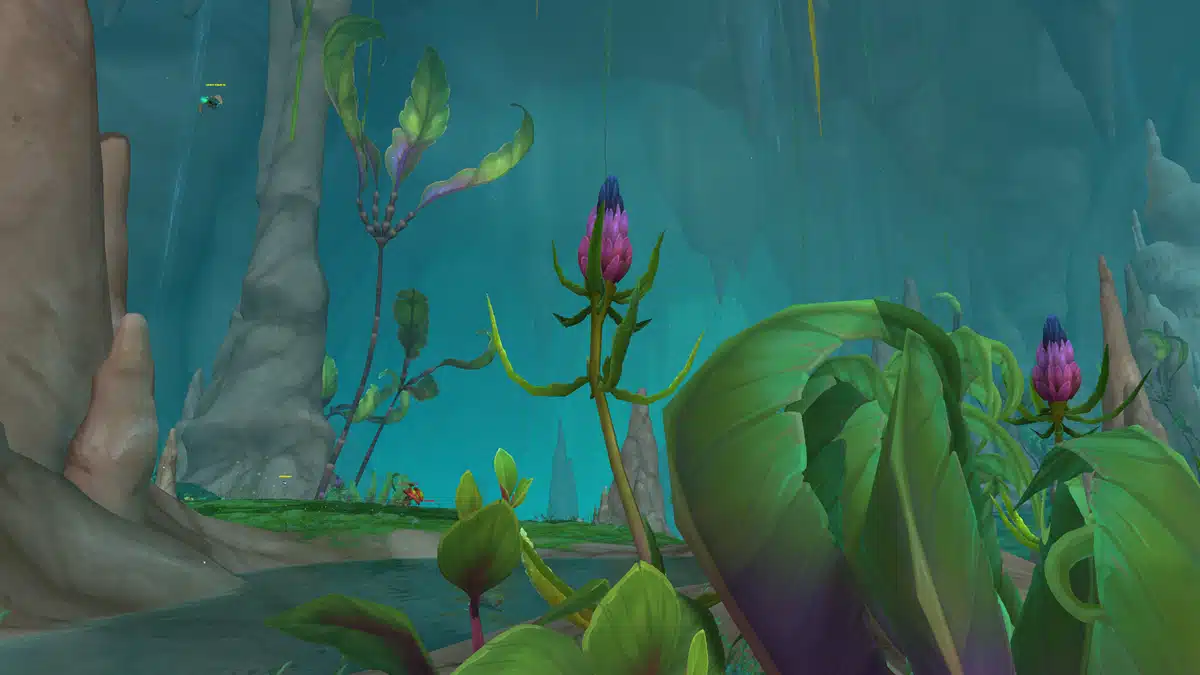If you’re wondering what the various herbalism modifiers in War Within are and what they do, you’ve come to the right place. In this article, we’ll explain everything you need to know about them, so you can be ready when you get a chance to play World of Warcraft’s new expansion.
Like the addition of professions, herbalism is a very useful profession if you want to earn gold without having to spend a lot of time on crafting. Therefore, the information in this article can certainly be useful to you.
The War Within Herbalism Modifiers Explained
Herbalism nodes in the game can come with a variety of modifiers, like Altered, Camouflaged, Crystallized, Irradiated, Lush, and Sporefused. Except for Camouflaged and Lush, the rest are considered Elemental types, which means they can be Overloaded.
Altered
These herbs show unhealthy red and orange discoloration due to exposure to the Black Blood of the Old Gods. Harvesting them infects you with Horrific Poison, slowing your movement and combat abilities for a minute. You can either wait it out or counter it by harvesting a Crystalline herb or ore (if you have Mining), which grants Crystalline Empowerment, making you immune to the poison.
Altered herbs are hard to come by, usually found deep underground in some of the toughest areas of Khaz Algar, particularly in high-level zones like Hallowfall and Azh-Kahet.
Overload
Overloading altered herbs triggers a mutation, turning them into a dangerous creature called a Twisted Lasher, which drops a valuable item called Writhing Samples. You can get even more Writhing Samples by overloading these herbs or Weeping mining nodes. Writhing Samples are a high-level material used in Enchanting, Tailoring, Leatherworking, and Skinning.
Herbalists who specialize in Altered herbs through the Overloading the Underground skill tree can reduce the risks, gather more Writhing Samples, and improve their Finesse and Perception when harvesting these herbs.
Camouflaged
Camouflaged herbs are invisible unless you find a way to reveal them. However, if a Herbalist earns 40 points in the Sporefused specialization under the Overloading the Underground skill tree, they will be able to see these hidden herbs when affected by the spores.
Overload
It can’t be Overloaded.
Crystallized
Crystallized herbs have a golden, shimmering appearance and can be found both above ground and underground. They’re one of the more common herb modifiers. Harvesting these herbs gives you Crystalline Empowerment, which boosts your secondary stats by 3%.
You can also use Crystallized herbs to cure the Horrific Poison from Altered herbs or Weeping mines. Additionally, you can grow your own Crystallized herbs in Rich Soil using a Crystallized Verdant Seed, which you get from the Cultivation sub-specialization under Botany.
Overload
Overloading a crystallized deposit creates a portal that transports you to another nearby deposit. However, unless you’ve specialized in the Crystallized skill under Overloading the Underground, this portal only works one way. So, make sure to pick the herb before using the portal.
Specialized miners and herbalists who have this skill can open a return portal after gathering at their destination. This is similar to the Titan-Touched herbs in Dragonflight. Learning the Crystallized specialization early on is helpful, as it turns the portal into a two-way trip.
Irradiated
Irradiated herbs glow with a shining ring near the ground. When you pick one, it throws you up and backward, similar to Windswept herbs in Dragonflight, which can cause minor damage unless you’re a Rogue with Safe Fall. The direction is predictable, so standing with your back against a wall or tree will stop you from being thrown far.
Once you unlock the ability to gather herbs while mounted through the Botany skill tree, you will still be flung, but you will be mounted, making it easier to recover. Until then, using Slow Fall or a Goblin Glider Kit can help if you’re on a high point. You can also grow Irradiated herbs in Rich Soil using an Irradiated Verdant Seed, obtained from the Cultivation sub-specialization under Botany.
Overload
Overloading an herb infused with arcane magic lets you absorb some of that magic, temporarily turning your Overload Empowered Herb ability into Arcane Duplication. This allows you to create a gatherable copy of the herb.
Herbalists can specialize in Irradiated herbs under the Overloading the Underground skill tree, which reduces the knockback effect and gives you the ability to use Arcane Duplication. Luckily, you only need to unlock the Irradiated subspecialization to reduce the knockback—you don’t need to invest any points into it.
Lush
Lush herbs are larger versions of regular herbs and give you a bigger yield. However, they can’t be overloaded since they’re not elemental, but they do count as modified herbs for skilling. You might also get higher-quality herbs from Lush nodes. Specializing in Mulching under the Botany tree helps you make the most of Lush nodes and lets you create different types of Mulch.
Overload
It can’t be Overloaded.
Sporefused
Sporefused herbs aren’t very common but are usually found in areas full of life. When you pick a Sporefused herb, it triggers Sporefused Visions, which temporarily alter how you see the world. These visions aren’t very useful until you fully upgrade the Sporefused tree in the Overloading the Underground skill, which then allows you to see Camouflaged herbs. You can also grow Sporefused herbs in Rich Soil using a Sporefused Verdant Seed, which comes from the Cultivation sub-specialization under Botany.
Overload
Overloading Sporefused herbs triggers a reaction with the magical spores, causing a strange event. This makes several herbs appear nearby. Picking the right herb will give you real reagents and materials, but picking the wrong ones will disorient and hurt you.


